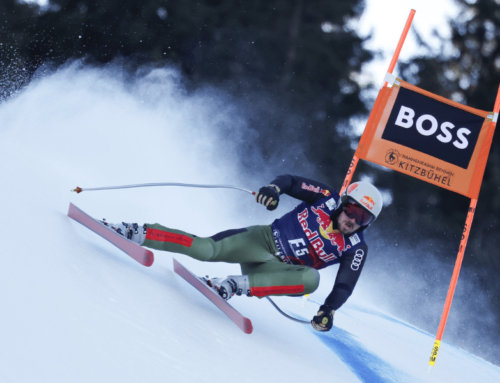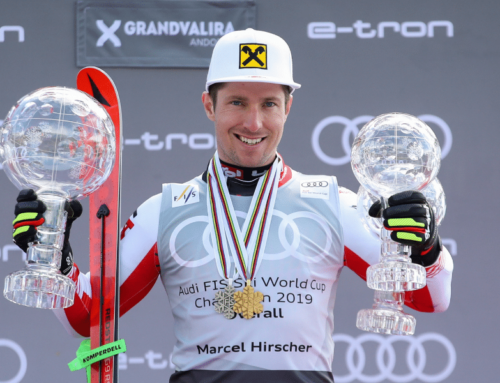Legendary ex-FIS chief Marc Hodler dies
 Marc Hodler, the longtime Swiss president of the International Ski Federation who guided the organization into the modern age while also exerting great influence on the International Olympic Committee, died Wednesday. He was 87.
Marc Hodler, the longtime Swiss president of the International Ski Federation who guided the organization into the modern age while also exerting great influence on the International Olympic Committee, died Wednesday. He was 87.
Hodler, who was president of the FIS from 1951 to 1998, died in Bern, Switzerland, after a “short, serious illness,” his son Beat said.
The IOC said Hodler had a stroke Sunday.
Hodler’s death came eight days before what would have been his 88th birthday.
“The IOC expresses its sadness at the passing of a member who dedicated so much to the Olympic movement,” IOC President Jacques Rogge said in a statement after arriving in Tokyo for a visit. “Our thoughts and prayers are with Mr. Hodler’s family.” For more reaction, click here.
Hodler, an IOC member since 1963, set off the bid scandal that led to the biggest ethics crisis in the history of the International Olympic Committee. In 1998, he detailed what he called systematic buying and selling of votes in the host city selection process for the 2002 Winter Games, which were ultimately awarded to Salt Lake City.
The crisis led to an unprecedented purge of IOC members, with six delegates expelled and four resigning for receiving improper gifts or benefits.
The IOC also enacted a series of reforms, including a ban on visits by members to bidding cities.
Hodler, a lawyer, was an IOC vice president from 1993 to 1997 and served four separate terms on the rule-making executive board.

MARC HODLER, the longtime Swiss president of the International Ski Federation who guided the organization into the modern age while also exerting great influence on the International Olympic Committee, died Wednesday. He was 87.
Hodler, who was president of the FIS from 1951 to 1998, died in Bern, Switzerland, after a “short, serious illness,” his son Beat said.
The IOC said Hodler had a stroke Sunday.
Hodler’s death came eight days before what would have been his 88th birthday.
“The IOC expresses its sadness at the passing of a member who dedicated so much to the Olympic movement,” IOC President Jacques Rogge said in a statement after arriving in Tokyo for a visit. “Our thoughts and prayers are with Mr. Hodler’s family.” For more reaction, click here.
Longtime U.S. ski racing official Leeland "Doc" Sosman, 86, said, "What always amazed me about him was that he had such a tremendously broad knowledge of so many different things. His ability as a diplomat was such an outstanding thing working at the FIS. I’m sorry to hear about [his death].
"Hodler had that ability to largely avoid having conflict arise. He was the individual you always thought of when you thought of the FIS and the way it was run."
Hodler, an IOC member since 1963, set off the bid scandal that led to the biggest ethics crisis in the history of the International Olympic Committee. In 1998, he detailed what he called systematic buying and selling of votes in the host city selection process for the 2002 Winter Games, which were ultimately awarded to Salt Lake City.
The crisis led to an unprecedented purge of IOC members, with six delegates expelled and four resigning for receiving improper gifts or benefits.
The IOC also enacted a series of reforms, including a ban on visits by members to bidding cities.
Hodler, a lawyer, was an IOC vice president from 1993 to 1997 and served four separate terms on the rule-making executive board.
Senior Canadian IOC member Dick Pound called Hodler ''the international face of the winter sports within the Olympic movement, someone whose judgment and experience will be sorely missed."
Hodler was the first official to use the word “bribe” to describe the methods used by Salt Lake City to win the vote for the 2002 Games.
In November 1998, a Salt Lake television station obtained a leaked document disclosing that the city’s Olympic bid team had set up a scholarship fund for the relatives of IOC members.
The story remained mainly a local controversy until two weeks later, when Hodler — the IOC official with oversight over the Salt Lake City Games — raised the stakes by declaring that the college tuition payments amounted to bribes.
But Hodler was just getting warmed up.
On Dec. 12, 1998, he unleashed a series of corruption allegations that shook the IOC to its foundations.
The marble lobby of the IOC’s headquarters was the setting for extraordinary scenes as Hodler, encircled by reporters, held court.
“To my knowledge, there has always, always, been a certain part of the vote given to corruption,” he said.
At one point, he took over a podium reserved for a sponsorship news conference and delivered his own impromptu briefing, while then IOC President Juan Antonio Samaranch and other officials watched in stunned silence.
Among Hodler’s allegations:
• Vote buying was common in the selection of Olympic host cities, including the successful bids of Atlanta, Nagano, Sydney and Salt Lake City.
• 5 to 7 percent of IOC members were open to bribes.
• Four agents, including one unidentified IOC member, bought and sold blocs of votes for up to US$1 million.
• Agents demanded payment of between US$3 million and US$5 million from cities winning the bid.
• The IOC set up an internal investigation which led to the ouster of 10 members and severe warnings for others. Hodler’s principal allegations — that agents buy and sell votes for big sums of money — were never confirmed, however.
The scandal led to the resignations of Salt Lake’s top two Olympic officials, Frank Joklik and Dave Johnson. Mitt Romney, a former venture capitalist and current Massachusetts governor, took over as the new organizing chief.
The U.S. Justice Department accused Salt Lake bid leaders Tom Welch and Johnson of lavishing US$1 million in cash, gifts and other inducements on IOC members. The federal government’s case against them was thrown out in mid-trial by a Utah judge.
The scandal spread to Sydney, Nagano, Atlanta and other cities, where bidding excesses were exposed.
While the scandal initially centered on the role of Salt Lake bid officials, the IOC quickly came under scrutiny. Critics accused the organization of fostering a corrupt bidding process and doing nothing to stop the abuses.
A year later, the IOC approved a 50-point reform package. The assembly voted to eliminate the biggest perk enjoyed by IOC members — traveling around the globe at the expense of bid cities desperate to win their votes.
&nbs
p; The IOC also lowered the age limit for new members, set term limits and put 15 active athletes on the committee.
Hodler’s allegations also led to a backlash against Switzerland. The Swiss town of Sion was the favorite in the bidding for the 2006 Winter Olympics, but an anti-Hodler vote gave the Games instead to Torino, Italy.
At the time of his death, Hodler was the second-longest-serving IOC member after Brazil’s Joao Havelange.
Over his 43-year career as an Olympic administrator, Hodler chaired the IOC commissions coordinating the Winter Games in Albertville (1992), Lillehammer (1994), Nagano (1998) and Salt Lake City. He also was chairman of the IOC finance commission from 1988-2002.
“One of the true greats of the Olympic world has gone with Marc Hodler,” current IOC Vice President Thomas Bach of Germany said.
Hodler was born Oct. 26, 1918, in the Swiss capital of Bern, where he later studied law and joined the firm of his father, Armin.
Hodler played a crucial role in the development of alpine skiing and the Winter Olympics. He was the first city dweller to make Switzerland’s national alpine ski team, which had previously been dominated by skiers from mountainous areas.
Hodler joined the team as a teenager, but had a serious accident while training for the 1938 World Championships that effectively ended his career. He never competed in an Olympics.
Instead, he turned to coaching, leading the Swiss team from 1939 to 1948.
As a lawyer, Hodler was responsible for drawing up the rules for the 1948 Winter Games, which were held in St. Moritz, Switzerland. Three years later, he was named president of the sport’s governing body, the International Ski Federation. He stayed in that role for 37 years.
Hodler was a university champion in handball and captained Bern’s golf club team. He also was a three-time winner of the Swiss national championship for bridge — which he lobbied hard to try to make an Olympic sport. While the bridge federation was recognized by the IOC in 1995, bridge has not been considered for inclusion in the Games.
Hodler is survived by his wife, Anna Rosa, and two sons, Beat and Martin.
A funeral service for Hodler will take place at 2 p.m. on Oct. 31 in Hodler's hometown of Bern, Switzerland, at the Cathedral of Berne.
— Sam Flickinger and The Associated Press contributed to this report





















